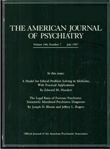Psychodynamic variables as predictors of psychotherapy outcome
Abstract
Predicting the outcome of psychotherapy is a central concern in psychiatry. Twenty-one medical students seeking psychotherapy were evaluated on a number of psychodynamic and process variables using self- report scales and scales completed by the therapist before, during, and after psychotherapy. There were significant differences between patients and a comparison group on eight variables before therapy. Ten psychodynamic variables (six representing ego defense mechanisms) and four process variables were found to be highly correlated with outcome measures; the process variables were the best predictors of outcome. The data support the use of psychodynamic and process variables as predictors of outcome in psychoanalytically oriented psychotherapy.
Access content
To read the fulltext, please use one of the options below to sign in or purchase access.- Personal login
- Institutional Login
- Sign in via OpenAthens
- Register for access
-
Please login/register if you wish to pair your device and check access availability.
Not a subscriber?
PsychiatryOnline subscription options offer access to the DSM-5 library, books, journals, CME, and patient resources. This all-in-one virtual library provides psychiatrists and mental health professionals with key resources for diagnosis, treatment, research, and professional development.
Need more help? PsychiatryOnline Customer Service may be reached by emailing [email protected] or by calling 800-368-5777 (in the U.S.) or 703-907-7322 (outside the U.S.).



